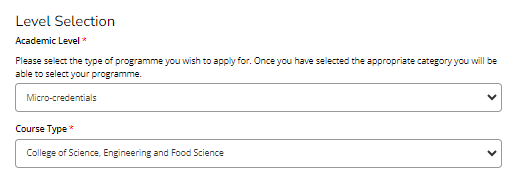| Code | NE6201 |
|---|---|
| Duration | 15 weeks |
| Teaching Mode | Part-Time. See Additional Teaching Mode Information for more info. |
| NFQ Level | Level 9 |
| Fees | €1,000 - HCI Subsidy initiative See Fees and Costs for full details. |
| Closing Date | 27/08/2025 |
| Venue | Blended delivery |
| Credits | 5 |
| Start Date | 10/09/2025 |
Outline
Module Goal
- Introduce students to wind energy theory and technology, resource assessment and wind farm site development.
Module Content
Additional Teaching Mode Information
- 12 x 2 Hr(s) lectures
- 2 x 2 Hr(s) tutorials
Practicalities
Learning Methods:
- 70 hours independent enquiry.
- 27 hours directed learning.
Why Choose
On successful completion of this module, students should be able to:
- Outline the origin of global, geostrophic and surface winds.
- Explain the impact of surface roughness and orography on wind speed profiles.
- Calculate wind speed at a given height using the log law and power law.
- Discuss different approaches to wind power forecasting and the relative benefits and limitations of each.
- Apply aerodynamic theory to analyse wind turbine rotor performance and passive and active wind turbine stall control.
- Model wind farm energy production and associated uncertainty.
- Discuss environmental impacts of wind farm construction, operation and decommissioning, and how they may be mitigated.
Skills and Careers Information
Learning Pathway:
Students completing this Micro Credential gain 5 credits exemption from the PG Cert in Offshore Renewable Energy.
Read more about that programme here PG Cert Offshore Renewable Energy
Requirements
Applicants must have:
- A Second Class Honours Grade 2 (or equivalent) in a primary honours degree (NFQ Level 8) in any discipline
of Engineering OR - a Second Class Honours Grade 2 (or equivalent) in a primary honours degree (NFQ Level 8) in areas of science
that required having completed level 8 mathematical subjects deemed equivalent to those of engineering (e.g. Physics, Mathematical Sciences, some Computing Science degrees), pending assessment by Programme Director OR - a pass in any accredited level 8 Engineering degree followed by professional experience deemed of sufficient added value, pending assessment by the Programme Director.
A quota will be allocated to applicants who do not meet these entry requirements. These applicants will be considered under Recognition of Prior Learning and assessed on the following factors:
- Academic achievement
- Prior Work Experience
- Letter of Reference
- Personal Statement
Fees and Costs
The HCI Pillar 3 Micro-credential Learner Fee Subsidy has been introduced to enable more learners to address critical skills gaps and engage with lifelong learning.
The fee for this micro-credential is €1,000 but applicants who meet the subsidy requirements can attend this micro-credential for €200.
Check your eligibility on the HEA Website
How To Apply
Please select the following options during your online application (once you have created your profile)
Start a new Micro-credentials application by selecting as below

In the application level tab select the options below and then select the programme/module you'd like to apply for

